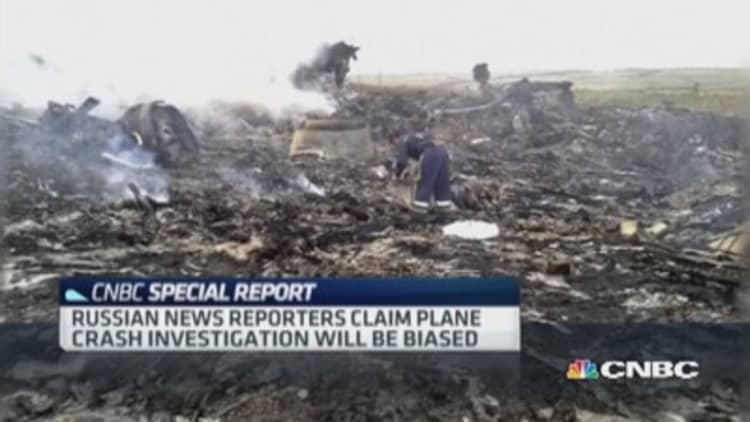A recent series of serious missteps by pro-Russian separatists has weakened Russian President Vladimir Putin's political hand and subjected him to global criticism, raising a question about the militants fighting in eastern Ukraine: Who are these guys?
As two aircraft carrying 40 bodies from the downed Malaysia Airlines plane arrived home in the Netherlands Wednesday, questions are still being asked by leaders around the world about why the pro-Russian fighters reportedly impeded an investigation of the crash site by Ukrainian and Western European officials—and may actually have shot the plane down, as well.
On Tuesday, Australian Prime Minister Tony Abbott said that despite some improvement in access to the scene of the crash, "There's still a hell of a long way to go before anyone could be satisfied with the way that site is being treated."
Read More
CNBC spoke to several sources and experts, among them Eurasia Group's Alexander Kliment and Johns Hopkins University fellow Donald Jensen, who helped break down the separatists' ranks in Eastern Ukraine into several factions:
- Pro-Russian Ukrainians who were loyal to ousted Ukrainian President Viktor Yanukovich.
- Mercenaries paid by Russian interests, including ethnic Chechens. Many of the rebels killed in Ukraine have been identified as Chechen nationals.
- Separatists from Russia whose end goal is the creation of their own republic.
- Russian special forces. Experts who have spoken with CNBC over the past several weeks are largely in agreement that Russian elite troops are on the ground in Ukraine and have been for months. Russia denies this.

Experts agree that the downing of Malaysia Airlines Flight 17 was unintentional; however, it has complicated Putin's plans to maintain dominance over Ukraine.
Johns Hopkins' Jensen said that the current crisis has brought to light divisions within the Kremlin on how to deal with Ukraine.
Russian separatist leader Igor Strelkov, who shortly after the crash sent out a Tweet boasting about a "birdie" flying out of the sky—and then subsequently deleted it after it became clear that an airliner had been shot down—has become something of a folk hero to hard-liners in Russia and even a political threat to Putin, according to Jensen.
Read MoreBackfire? How Russian sanctions could hit Europe
"Putin has publicly performed statesman, but privately supported the rebels," said Jensen, who added that now, there's more pressure to make a decision.
Kliment at Eurasia Group told CNBC that Russia's precise level of operational support to separatists is open to question but that Moscow has empowered those forces in order to destabilize Eastern Ukraine.
"This fits with the Kremlin's larger strategy of weakening Kiev to the point that (Ukrainian President Petro) Poroshenko has to concede constitutional changes that would give Russia de facto influence over Kiev's foreign and trade policy decisions," he said.
The crux of the dispute and the reason for U.S. sanctions has been the flow of Russian weapons across the border, which Russians denied all along—but Russian denial this time will not matter.Matthew RojanskyDirector, Kennan Institute
But that's precisely where things get complicated. As Russia and the United States have both learned in the past, a problem with arming unpredictable and unstable proxy groups is that they tend to take on a life of their own.
"Putin has created a monster he can't fully control now," Jensen said. "The Kremlin has denied controlling the separatists, which is bogus. It is true, though, that they can't control everything."
Before the downing of Flight 17, Putin had already begun publicly distancing himself from the rebels, stoking anger among some separatists who claimed that the Russian president was abandoning them.
Read MoreUS says separatists likely shot down MH17 'by mistake'
The director of the Kennan Institute, a division of the Woodrow Wilson International Center for Scholars that studies Ukraine and Russia, told CNBC that the current conflict is the deepest crisis in Russia-Western relations since 1991.
"The crux of the dispute and the reason for U.S. sanctions has been the flow of Russian weapons across the border, which Russians denied all along—but Russian denial this time will not matter," Matthew Rojansky said.
But Ian Brzezinski, a senior fellow at the Atlantic Council who focuses on trans-Atlantic security, told CNBC that the response from the West so far has been mostly "rhetorical."
"That is unlikely to cause Putin to change his calculus," Brzezinski said.


